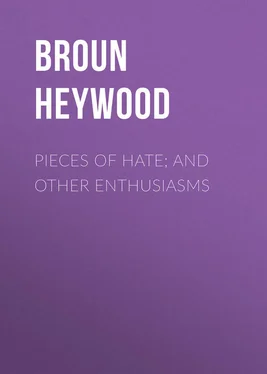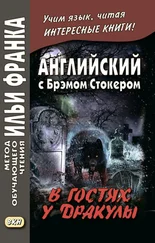Heywood Broun - Pieces of Hate; And Other Enthusiasms
Здесь есть возможность читать онлайн «Heywood Broun - Pieces of Hate; And Other Enthusiasms» — ознакомительный отрывок электронной книги совершенно бесплатно, а после прочтения отрывка купить полную версию. В некоторых случаях можно слушать аудио, скачать через торрент в формате fb2 и присутствует краткое содержание. Жанр: foreign_antique, foreign_prose, foreign_language, на английском языке. Описание произведения, (предисловие) а так же отзывы посетителей доступны на портале библиотеки ЛибКат.
- Название:Pieces of Hate; And Other Enthusiasms
- Автор:
- Жанр:
- Год:неизвестен
- ISBN:нет данных
- Рейтинг книги:5 / 5. Голосов: 1
-
Избранное:Добавить в избранное
- Отзывы:
-
Ваша оценка:
- 100
- 1
- 2
- 3
- 4
- 5
Pieces of Hate; And Other Enthusiasms: краткое содержание, описание и аннотация
Предлагаем к чтению аннотацию, описание, краткое содержание или предисловие (зависит от того, что написал сам автор книги «Pieces of Hate; And Other Enthusiasms»). Если вы не нашли необходимую информацию о книге — напишите в комментариях, мы постараемся отыскать её.
Pieces of Hate; And Other Enthusiasms — читать онлайн ознакомительный отрывок
Ниже представлен текст книги, разбитый по страницам. Система сохранения места последней прочитанной страницы, позволяет с удобством читать онлайн бесплатно книгу «Pieces of Hate; And Other Enthusiasms», без необходимости каждый раз заново искать на чём Вы остановились. Поставьте закладку, и сможете в любой момент перейти на страницу, на которой закончили чтение.
Интервал:
Закладка:
"'They all seem to get over it!'
"'Over what?'
"'The fellows who have graduated,' Curly explained. 'I guess they all feel pretty poor when they leave, but they get over it right away. It's just like changing into a new suit, I expect.'
"'Yeah, I guess so'…
"'Well, goo' night, little feller'…
"'Goo' night, Teddy.'"
But we do wish Mr. Minnigerode had been a little more explicit and had told us who tucked them in.
IX
FOR OLD NASSAU
Wadsworth Camp, we find, has done almost as much for Princeton in his novel, "The Guarded Heights," as Meade Minnigerode has accomplished for Yale in "The Big Year."
George Morton might never have gone to any college if it had not been for Sylvia Planter. He was enamored of her from the very beginning when old Planter engaged him to accompany his daughter on rides, but his admiration did not become articulate until she fell off her horse. She seems to have done it extremely well. "He saw her horse refuse," writes Mr. Camp, "straightening his knees and sliding in the marshy ground. He watched Sylvia, with an ease and grace nearly unbelievable, somersault across the hedge and out of sight in the meadow beyond."
It seemed to us that the horse should have received some of the credit for the ease with which Sylvia shot across the hedge, but young Morton was much too intent upon the fate of his goddess to have eyes for anything else. When he found her lying on the ground she was unconscious, and so he told her of his love. That brought her to and she called him "You – you – stable boy." And so George decided to go to college.
His high school preparation had been scant and irregular. He went to Princeton, and after two months' cramming passed all his examinations. Football attracted him from the first as a means to the advancement which he desired. "With surprised eyes," writes our author, "he saw estates as extravagant as Oakmont, and frequently in better taste. Little by little he picked up the names of the families that owned them. He told himself that some day he would enter those places as a guest, bowed to by such servants as he had been. It was possible, he promised himself bravely, if only he could win a Yale or a Harvard game."
Perhaps this explains why one meets so few Princeton men socially. Some, we have found, are occasionally invited to drop in after dinner. These, we assume, are recruited from the ranks of those Princetonians who have tied Yale or Harvard or at least held the score down.
Like Mr. Minnigerode, Mr. Camp employs symbolism in his story. In the Yale novel we had Corliss evidently standing for Coy. Just which Princeton hero George Morton represents we are not prepared to say. In fact, the only Princeton name which comes to mind at the moment is that of Big Bill Edwards who used to sit in the Customs House and throw them all for a loss. Morton can hardly be intended for Edwards because it seems unlikely that anybody would ever have engaged Big Bill to ride horses; no, not even to break them. A little further on, however, we are introduced to the Princeton coach, a certain Mr. Stringham. Here, to be sure, identification is easy. Stringham, we haven't a doubt, is Roper. We could wish Mr. Camp had been more subtle. He might, for instance, have called him Cordier.
In some respects Morton proved an even better football player than Corliss. He did not score any greater number of touchdowns, but he had more of an air with him. Thus, in the account of the Harvard game it is recorded: "Then, with his interference blocked and tumbling, George yielded to his old habit and slipped off to one side at a hazard. The enemy's secondary defense had been drawing in, there was no one near enough to stop him within those ten yards and he went over for a touchdown and casually kicked the goal."
Eventually, George Morton did get asked to all the better houses, but still Sylvia spurned him. "Go away and don't bother me," was the usual form of her replies to his ardent words of wooing. Naturally he knew that he had her on the run. A man who had taken more than one straight arm squarely in the face during the course of his football career was not to be rebuffed by a slip of a girl.
The war delayed matters for a time, and George went and was good at that too. He was a major before he left Plattsburgh. For a time we feared that he was in danger of becoming a snob, but the great democratizing forces of the conflict carried him into the current. One of the most thrilling chapters in the book tells how he exposed his life under very heavy fire to go forward and rescue an American who turned out to be a Yale man.
There was no stopping George Morton. In the end he wore Sylvia down. Nothing else could be expected from such a man. German machine guns and heavy artillery had failed to stop him and he had even hit the Harvard line, upon occasion, without losing a yard.
His head was hard and he could not take a hint. In the end Sylvia just had to marry him. Her right hand swing was not good enough. "As in a dream he went to her, and her curved lips moved beneath his, but he pressed them closer so that she couldn't speak; for he felt encircling them in a breathless embrace, as his arms held her, something thrilling and rudimentary that neither of them had experienced before – "
And as we read the further details of the love scene it seemed to us that George Morton had made a most fortunate choice when he decided to go to Princeton. His football experience stood him in good stead in his love-making, for he had been trained with an eleven which tackled around the neck.
X
MR. DEMPSEY'S FIVE-FOOT SHELF
It is hardly fair to expect Jack Dempsey to take literature very seriously. How, for instance, can he afford to pay much attention to George Bernard Shaw who declared just before the fight that Carpentier could not lose and ought to be quoted at odds of fifty to one? From the point of view of Dempsey, then, creative evolution, the superman and all the rest, are the merest moonshine. He might well take the position that since Mr. Shaw was so palpably wrong about the outcome of the fight two days before it happened, it scarcely behooves anybody to pay much attention to his predictions as to the fate of the world and mankind two thousand years hence.
Whatever the reason, Jack Dempsey does not read George Bernard Shaw much. But he has heard of him. When some reporter came to Dempsey a day or so before the fight and told him that Shaw had fixed fifty to one as the proper odds on Carpentier, the champion made no comment. The newspaper gossiper, disappointed of his sensation, asked if Dempsey had ever heard of Shaw and the fighter stoutly maintained that he had. The examination went no further but it is fair to assume that Dempsey did know the great British sporting writer. It was not remarkable that he paid no attention to his prediction. Dempsey would not even be moved much by a prediction from Hughie Fullerton.
In other words literature and life are things divorced in Dempsey's mind. He does read. The first time we ever saw Dempsey he discussed books with not a little interest. He was not at his training quarters when we arrived but his press agent showed us about – a singularly reverential man this press agent. "This," he said, and he seemed to lower his voice, "is the bed where Jack Dempsey sleeps." All the Louises knew better beds and so did Lafayette even when a stranger in a strange land. Washington himself fared better in the midst of war. Nor can it be said that there was anything very compelling about the room in which Dempsey slept. It had air but not much distinction. There were just two pictures on the wall. One represented a heavy surf upon an indeterminate but rather rockbound coast and the other showed a lady asleep with cupids hovering about her bed. Although the thought is erotic the artist had removed all that in the execution.
Читать дальшеИнтервал:
Закладка:
Похожие книги на «Pieces of Hate; And Other Enthusiasms»
Представляем Вашему вниманию похожие книги на «Pieces of Hate; And Other Enthusiasms» списком для выбора. Мы отобрали схожую по названию и смыслу литературу в надежде предоставить читателям больше вариантов отыскать новые, интересные, ещё непрочитанные произведения.
Обсуждение, отзывы о книге «Pieces of Hate; And Other Enthusiasms» и просто собственные мнения читателей. Оставьте ваши комментарии, напишите, что Вы думаете о произведении, его смысле или главных героях. Укажите что конкретно понравилось, а что нет, и почему Вы так считаете.












